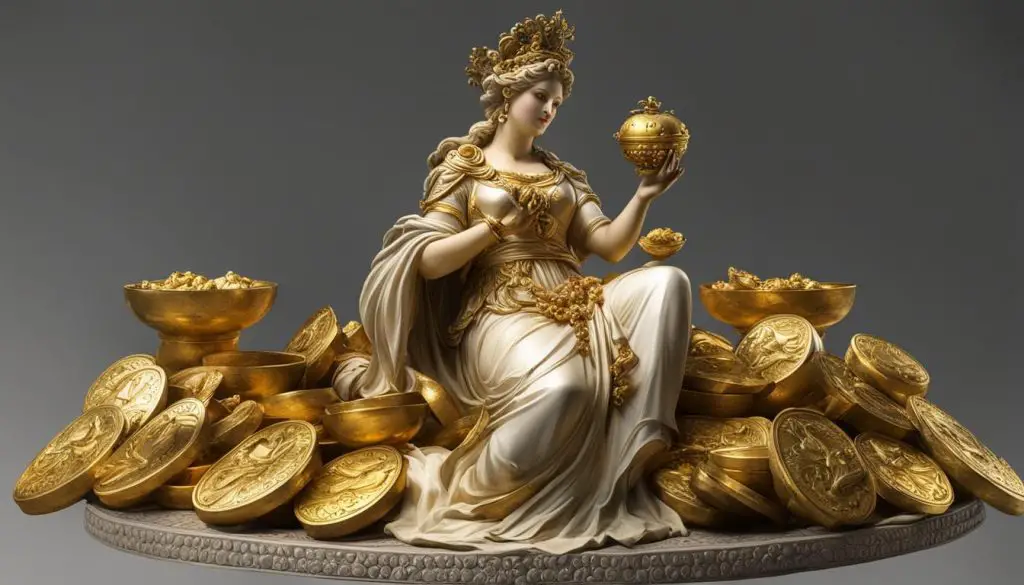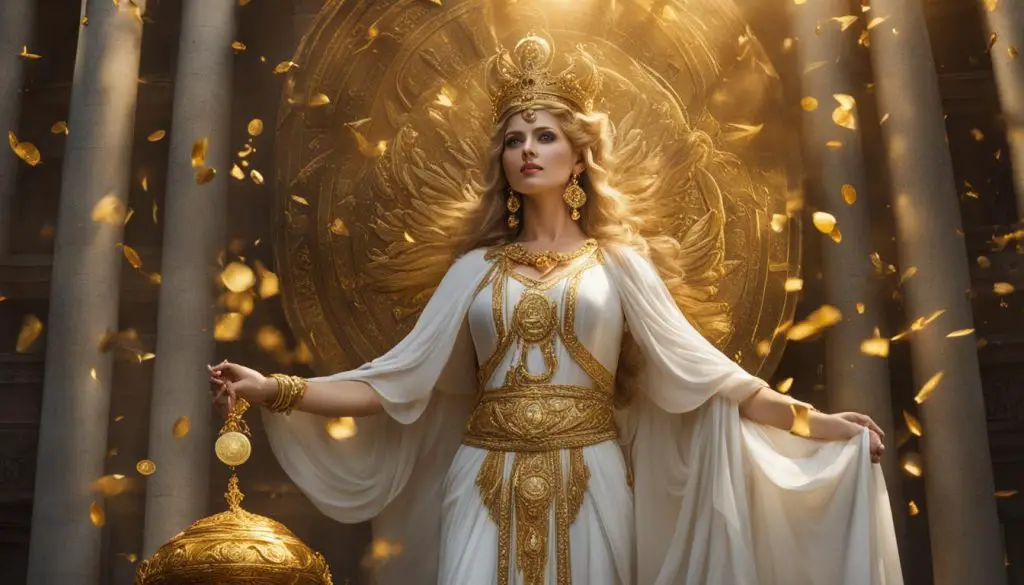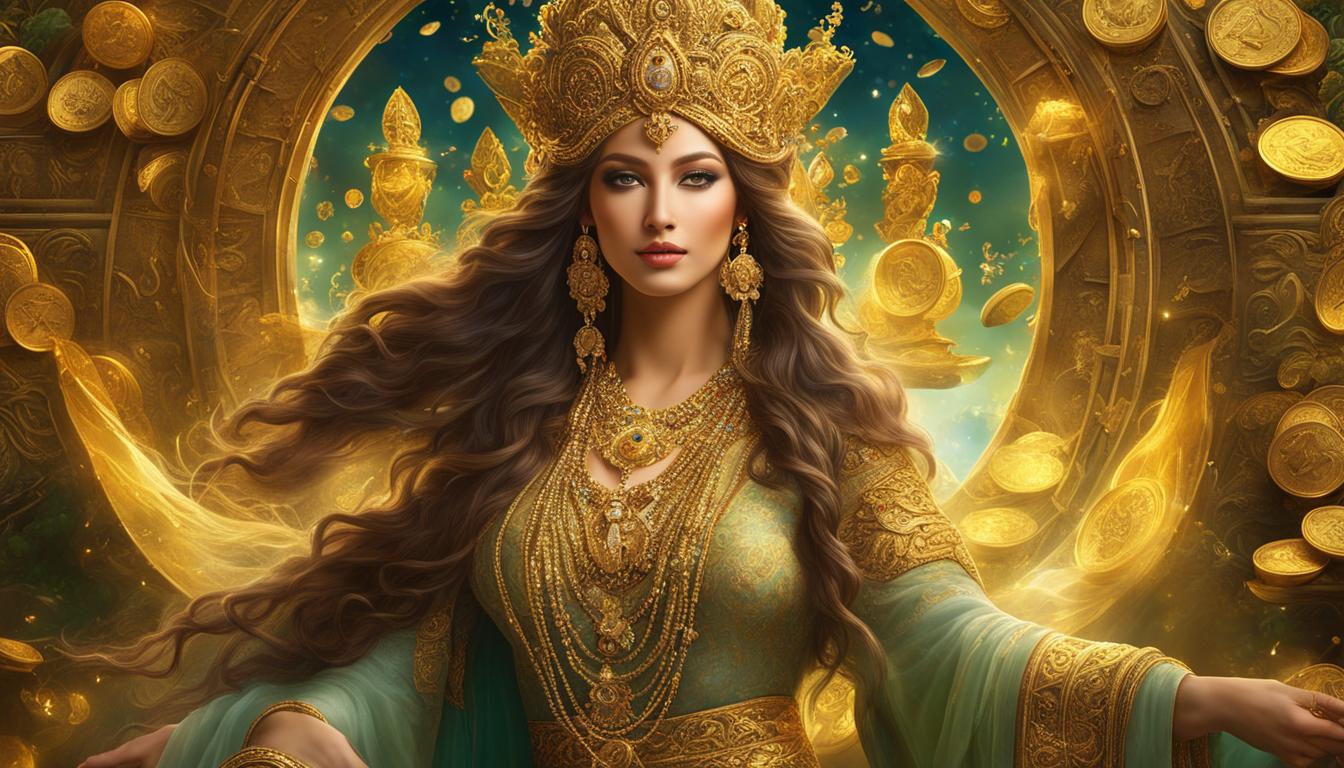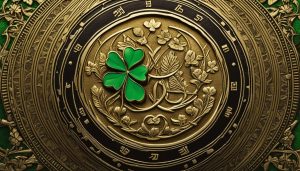Are you searching for the goddess who can bring wealth and good fortune into your life? Look no further – we are here to reveal the answer for you. In this article, we will delve into the fascinating world of two powerful goddesses associated with prosperity and luck. Discover the ancient myths and beliefs surrounding these deities and learn how they can positively influence your life. Let’s explore the goddesses of wealth and luck together.
Contents
Key Takeaways:
- Vasudhara and Fortuna are revered as the goddesses of wealth, prosperity, and good luck.
- Vasudhara is venerated in Buddhism and Hinduism as the goddess of abundance and holistic prosperity.
- Fortuna holds a significant place in Roman society as the deity of luck and fortune.
- Both goddesses symbolize the ever-changing nature of fortune and its impact on human existence.
- Explore the fascinating myths and legends surrounding these goddesses to unlock their blessings in your life.
The Origins of Goddess Vasudhara
The goddess Vasudhara is a deity of prosperity and fortune, known as the lucky goddess of abundance. Her worshipers believe that she is the divine bringer of wealth and good luck. According to legend, Vasudhara originated from the Buddhist text “The Vasudhara Dharani.” The story revolves around a layman named Sucandra who approached Buddha Shakyamuni seeking help in acquiring wealth to support his large family and contribute to charitable causes.
The Buddha recommended the Vasudhara mantra and ritual to Sucandra, which resulted in his fortune flourishing. This tale highlights the importance of using wealth for the benefit of many and alleviating suffering. It also emphasizes the connection between material prosperity and spiritual well-being. The origins of Vasudhara showcase her role as a deity who grants abundance and prosperity to those who seek her blessings.
To illustrate this concept, consider the following table:
| Deity | Association |
|---|---|
| Vasudhara | Deity of prosperity and fortune |
| Lucky Goddess | Bringer of wealth and good luck |
| Divine Figure | Associated with abundance and luck |
As seen in the table, Vasudhara is closely associated with prosperity, fortune, and abundance. Her origins in Buddhist mythology highlight her status as a divine figure who brings wealth and good luck to her worshipers. Through the Vasudhara mantra and ritual, individuals can connect with her energy and invoke her blessings for a prosperous and fulfilling life.
Vasudhara in Buddhism and Hinduism
Vasudhara is a revered goddess in both Buddhism and Hinduism. She is known as the goddess of prosperity and luck, and is associated with wealth and abundance. In Buddhism, Vasudhara is considered a bodhisattva and is one of the manifestations of the divine Tara. She represents boundless generosity and helps individuals overcome obstacles in acquiring wealth and abundance in their lives.
In Hinduism, Vasudhara is often seen as another form of the primary goddess of wealth, Lakshmi. Both deities share similar iconography and are associated with material and spiritual prosperity. Worshipping Vasudhara or Lakshmi is believed to bring good fortune and attract wealth and abundance to one’s life.
It is interesting to note how the reverence for Vasudhara transcends religious boundaries and is celebrated in both Buddhism and Hinduism. She holds a significant place in the hearts and minds of believers who seek her blessings for a prosperous and fortunate life.
Iconography of Vasudhara:
Image:
| Symbol | Description |
|---|---|
| Lotus Flower | Vasudhara is often depicted sitting on a lotus flower, symbolizing purity and enlightenment. |
| Treasure Vase | In her four arms, Vasudhara holds a treasure vase, representing abundance and wealth. |
| Sheaf of Grain | One of Vasudhara’s arms carries a sheaf of grain, symbolizing nourishment and the bountiful harvest. |
Vasudhara’s iconography may vary, with different depictions showing her with additional elements such as a bow and arrow. In Tantric art, she is portrayed with a red complexion, holding a stem of grains or precious gems and a skull cup. Sometimes, Vasudhara is shown in union with her consort, Dzambhala, further emphasizing the connection between wealth and abundance.
The visual representation of Vasudhara’s iconography helps believers connect with her divine qualities and invoke her blessings of prosperity and luck in their lives.
The Iconography of Vasudhara Goddess
Vasudhara, the goddess of prosperity and luck, is commonly depicted in various forms of art and sculpture. Her iconography represents her attributes and qualities that are associated with wealth and abundance. Let’s explore the different aspects of Vasudhara’s visual representation:
Vasudhara’s Physical Appearance
Vasudhara is often portrayed as a beautiful goddess with a serene expression. She is depicted with a red complexion, symbolizing her divine nature and auspiciousness. In some representations, she may have multiple arms, typically four, each holding different objects that hold symbolic significance.
The Lotus and the Treasure Vase
The lotus flower is a prominent element in the iconography of Vasudhara. She is commonly shown seated on a lotus, which symbolizes purity, enlightenment, and spiritual growth. The lotus also represents the fertile ground from which abundance and prosperity bloom.
Another significant attribute of Vasudhara is the treasure vase that she holds in one of her hands. This vase is filled with precious gems and jewels, signifying wealth and material abundance. It represents the limitless resources that Vasudhara can bestow upon her devotees.
Other Symbolic Representations
In addition to the lotus and the treasure vase, Vasudhara may be depicted with other symbolic objects. These can include a sheaf of grain, which represents fertility, nourishment, and bountiful harvests, symbolizing both material and spiritual abundance.
Some artistic interpretations of Vasudhara also feature her holding a bow and arrow, signifying her ability to conquer obstacles and bring success. These symbols highlight her role as a goddess of luck and fortune, guiding her devotees towards prosperity and happiness.

Overall, the iconography of Vasudhara reflects the qualities and attributes associated with wealth, prosperity, and good luck. Her depiction in various forms of art serves as a visual reminder of her divine presence and the blessings she bestows upon those who seek her guidance.
Fortuna: The Roman Goddess of Luck and Fortune
In Roman mythology, Fortuna is revered as the goddess of luck and fortune. She holds a significant place in the hearts of the ancient Romans, as her influence is believed to govern the outcomes of their lives. Fortuna’s depiction often includes a cornucopia, symbolizing abundance, and a ship’s rudder, representing her control over fate. Her presence in Roman art, literature, and beliefs highlights her importance in the daily lives of the people.
Fortuna’s role in Roman society is deeply intertwined with the concept of luck and fortune. The Romans sought her favor through prayers, rituals, and offerings, believing that she held the power to shape their destinies. Temples and shrines dedicated to Fortuna were spread across Rome, showcasing the extent of her worship and influence. From birth to death, Fortuna’s presence permeated every aspect of Roman society, underscoring her role as the goddess of luck and fortune.
Fortuna’s connections with other Roman gods and goddesses further demonstrate her impact in mythology. She is often associated with Venus, the goddess of love and beauty, showcasing the connection between luck and love. Additionally, her relationships with Juno, the goddess of marriage and childbirth, highlight the influence of fortune in these vital aspects of life. Fortuna’s associations with various deities underscore her widespread significance in the Roman pantheon.
| Mythology | Aspect |
|---|---|
| Roman | Goddess of Luck and Fortune |
The goddess Fortuna and her role as the deity of luck and fortune provide insight into the ancient Roman belief system. As individuals sought to navigate the uncertainties of life, they turned to Fortuna for guidance and blessings. Her depiction with symbols of abundance and fate exemplified her role in providing prosperity and influencing the outcomes of mortal lives.
Fortuna in Roman Society
Fortuna played a vital role in the daily lives of ancient Romans. They believed she controlled one’s destiny and sought her favor through prayers, rituals, and offerings. Fortuna’s worship was prevalent, and her temples and shrines were widespread throughout Rome. She was also recognized and revered by the imperial cult and state religion. Fortuna’s presence permeated every aspect of Roman society, from birth to death.
One of the key reasons for Fortuna’s significance in Roman society was her association with luck and fortune. The Romans believed that Fortuna had the power to influence the outcomes of their lives, both positively and negatively. They sought her blessings and guidance in various endeavors, including business, relationships, and personal endeavors. The belief in Fortuna’s influence on luck and fortune was so strong that her presence was felt in almost every aspect of daily life.
Fortuna’s influence extended beyond the individual level and had societal implications as well. The Romans believed that Fortuna’s favor granted the empire prosperity, abundance, and good fortune. Consequently, emperors and leaders made offerings and sacrifices to Fortuna to ensure the well-being and success of the Roman people. Fortuna’s role as the goddess of luck and fortune was deeply ingrained in Roman culture and society.
In conclusion, Fortuna held a significant place in Roman society as the goddess of luck and fortune. She was revered and worshipped by the Romans, who believed in her power to shape their destinies. Fortuna’s presence was felt throughout all aspects of Roman life, from personal endeavors to the prosperity of the empire. Her influence on luck and fortune had a profound impact on the beliefs and practices of the ancient Romans, making her a deity of opulence and affluence.

Fortuna’s Relationships with Other Roman Gods
Fortuna, the goddess of luck and fortune, had significant associations with other deities in the Roman pantheon. These connections exemplified her widespread influence and showcased the intersection of luck with various aspects of life. Let’s explore some of Fortuna’s key relationships:
Venus
Fortuna and Venus, the goddess of love and beauty, were closely associated in Roman mythology. This connection highlighted the intertwining of luck and love, suggesting that fortune played a role in matters of the heart. Romans believed that Fortuna’s favor could impact their romantic relationships and contribute to their overall happiness.
Juno
Juno, the goddess of marriage and childbirth, was another deity with whom Fortuna shared a connection. This association emphasized the role of luck and fortune in these important aspects of life. Romans believed that Fortuna’s influence could sway the outcome of marriages and childbirth, underscoring the belief that luck played a crucial role in family life.
| Deity | Association |
|---|---|
| Venus | Intersection of luck and love |
| Juno | Influence on marriages and childbirth |
“The connections between Fortuna and other Roman deities highlight the pervasive influence of luck and fortune in various aspects of life, from matters of the heart to family matters.” – Roman Mythology Scholar
Other Connections
Fortuna also had associations with other gods and goddesses, such as Jupiter, the king of the gods, and Mars, the god of war. These connections underscored the far-reaching impact of fortune and its presence in different domains of Roman society. Fortuna’s relationships with various deities added depth to her character and emphasized her status as a goddess of abundance and good fortune.
Overall, Fortuna’s relationships with other Roman gods and goddesses served as a testament to her significance in Roman mythology. The interconnected nature of these deities highlighted the pervasive influence of luck and fortune in all aspects of life, from matters of love and marriage to larger societal spheres. Fortuna was revered for her ability to bestow both good and bad fortune, solidifying her reputation as a deity of opulence and abundance.

Conclusion
In conclusion, the goddesses Vasudhara and Fortuna hold significant roles as symbols of luck, fortune, and abundance in different cultures. Vasudhara is revered in Buddhism and Hinduism, embodying the qualities necessary for acquiring wealth and leading a fulfilling life. Her association with prosperity and holistic well-being makes her a deity of opulence and affluence. On the other hand, Fortuna played a vital role in Roman society as the goddess of luck and fortune, influencing various aspects of daily life. Her presence in Roman art, literature, and beliefs showcases her status as a fortune and abundance deity.
Both goddesses highlight the ever-changing nature of fortune and its impact on human existence. Vasudhara’s veneration in Buddhism and Hinduism emphasizes the need for balance between material wealth and spiritual well-being. Fortuna’s associations with other Roman gods and her control over destiny underscore her crucial role in shaping the lives of mortals. Whether seeking wealth, luck, or fortune, both Vasudhara and Fortuna offer insights into the complexities of human desires and aspirations.
So, whether you seek the blessings of the goddess of luck and fortune or the deity of opulence and affluence, the stories and symbolism associated with Vasudhara and Fortuna remind us of the ever-present role that luck and fortune play in our lives. Embracing their teachings and qualities can inspire us to strive for abundance, happiness, and a fulfilling life.
FAQ
Who is Vasudhara?
Vasudhara is a goddess in Buddhist mythology who is revered as the goddess of wealth and abundance. She is known for bringing good luck and prosperity to those who worship her.
What is the origin of the goddess Vasudhara?
The goddess Vasudhara originated from the Buddhist text “The Vasudhara Dharani.” According to legend, a layman named Sucandra approached Buddha Shakyamuni for help in acquiring wealth. The Buddha recommended the Vasudhara mantra and ritual, which led to Sucandra’s fortune flourishing.
How is Vasudhara venerated in Buddhism and Hinduism?
Vasudhara is considered a bodhisattva and one of the 21 manifestations of Divine Tara in Buddhism. In Hinduism, she is often seen as another form of the primary goddess of wealth, Lakshmi. She is associated with material and spiritual prosperity in both religions.
What is the iconography of Vasudhara?
Vasudhara is commonly depicted as a beautiful, four-armed goddess sitting on a lotus flower. She holds a treasure vase symbolizing abundance and a sheaf of grain representing nourishment. Her appearance may vary in different depictions.
Who is Fortuna?
Fortuna is a prominent deity in Roman mythology associated with luck and fortune. She is believed to bestow both good and bad fortune upon mortals.
What was Fortuna’s role in Roman society?
Fortuna played a vital role in the daily lives of ancient Romans. They believed she controlled one’s destiny and sought her favor through prayers, rituals, and offerings. Her temples and shrines were widespread throughout Rome.
Did Fortuna have connections with other gods in Roman mythology?
Yes, Fortuna was often associated with other deities such as Venus, the goddess of love and beauty, and Juno, the goddess of marriage and childbirth. These connections showcased her influence in various aspects of life.





